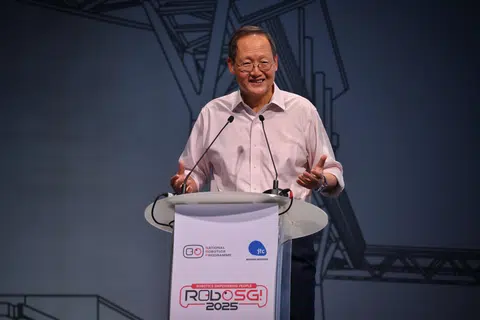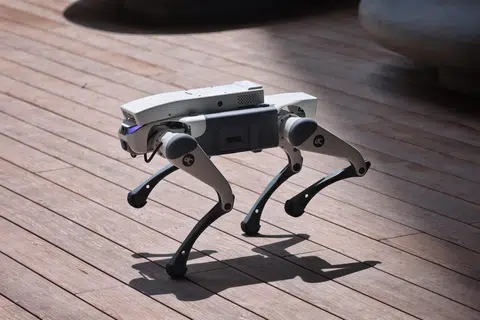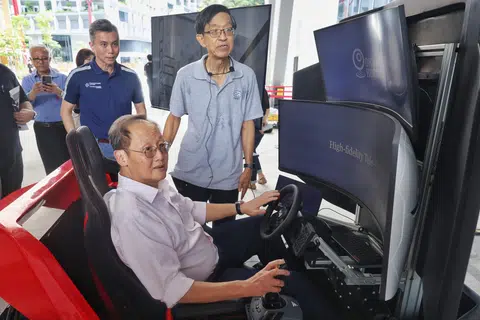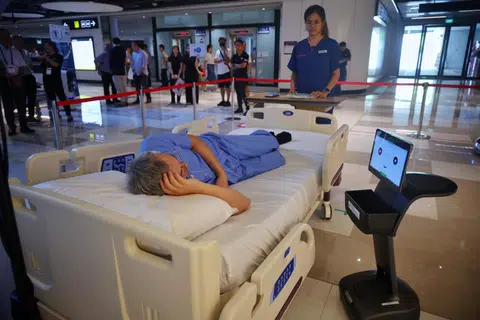Humanoid robots to take on concierge, office chores in Singapore
With human-like hands and legs, humanoid robots can manoeuvre through confined spaces and handle tools meant for humans.
Androids will soon find new jobs in Singapore too, with local robotics company dConstruct Robotics planning to deploy humanoids as an assistant for concierge services and chores in the office through a tie-up with US robotics firm Persona AI.
Such androids, designed to take over human workers in high-risk work settings, are increasingly being tested in heavy industries and manufacturing plants by the likes of US firms Boston Dynamics and Tesla, and Chinese manufacturers such as Deep Robotics.
A mock-up of a humanoid robot by Persona AI was showcased in a robotics fair called RoboSG! held on March 14 at the Punggol Digital District (PDD), earmarked to be the largest regional test bed for robotic applications.
"How do you get a robot to climb steps, open doors and handle human equipment without having to build a new robot just for each purpose? Best way is to replicate the human form, because it can be applied to any industry," said Mr Nicolaus Radford, co-founder and chief executive of Persona AI.
To boost Singapore's robotics standing on the global stage, Manpower Minister and Second Minister for Trade and Industry Tan See Leng announced an accelerator initiative on March 14 to support local robotics firms with business consultancy and client connections.
Dubbed RoboNexus, the initiative also connects promising local firms to venture firms for funding.

"Often, while these start-ups have innovative robotics technologies, they are less familiar in terms of how to get funding or in crafting a strategy to sell the product," said Dr Tan in announcing RoboNexus.
"We will therefore pull together existing resources to support these companies in their growth journey."
RoboNexus is managed by the National Robotics Programme (NRP), an office that oversees the research and development of robotics here. NRP is funded by the National Research Foundation and hosted by the Agency for Science, Technology and Research.
NRP also organised the RoboSG! fair, which gathered 75 robots, including those for manufacturing, cleaning and delivery, across 65 booths.
"As innovation accelerates, there is strong promise for what the robotics industry could bring... Rapid advancements in AI are also laying the ground for new growth areas, like humanoid robotics," Dr Tan said.
He added: "We are a small market, but that should not stop us from riding the wave and catching the sails."

dConstruct, which supplies robots such as surveillance bots used at the Singapore Zoo, is among six companies involved in a pilot for RoboNexus. The others include cleaning robot company LionsBot and patrol bot-maker Kabam Robotics.
dConstruct chief executive Chinn Lim said his company plans to test Persona AI's humanoid concierge robots in late 2025 in the PDD, where his company and other tech firms are currently relocating to.
PDD offers an Open Digital Platform, an estate-wide computer operating system that allows robots and all kinds of sensors to plug in and be controlled centrally, reducing technical challenges to allow companies to stress-test their systems. The system is jointly developed by GovTech and JTC, which oversaw the district's development.
Robots galore at RoboSG!
The number of exhibitors at RoboSG!, held every two years, has more than doubled since the last edition in 2023, then called the NRP6 Festival.
It reflects the rapid growth of the robotics sector here, which grew from around 200 companies in 2023 to more than 300 today, according to NRP's database, said its chief executive Quek Tong Boon.
Here are some of the robots on display on March 14.
Remote-controlled vehicles

Orient Robotics' remote-controlled driving platform allows vehicle operators to control forklifts or sweepers remotely from an arcade-like driving console.
Forklift operators at Commonwealth Kokubu Logistics have used the platform, initially developed at Nanyang Technological University, since early 2025 to transport food and items in cold storage facilities, reducing the risk for employees working in sub-zero temperatures.
Robot nurses

Healthcare robots will progressively be deployed in institutions like Changi General Hospital (CGH) in 2025 to deliver medication and meals, monitor patient safety and facilitate calls with human nurses. They can also guide patients and visitors around the hospital.
The robot assistants aim to take the load off nurses amid a manpower crunch, so that they can focus on more urgent matters. Other institutions like the National University Hospital (NUH) are also testing the use of robot nurses to assist nurses in wards.
Robots have become more mobile and better equipped to support the work of nurses, said assistant director Lee Eu Gin from the Centre For Healthcare Assistive and Robotics Technology (Chart), which supports the deployment of robotics across healthcare institutions. There are more than 80 robots in CGH's fleet.
Mr Lee said: "By helping to alleviate tedious or repetitive tasks, the use of robots at CGH helps our nurses to focus on more meaningful patient interaction and bedside care."
Osmond Chia for The Straits Times